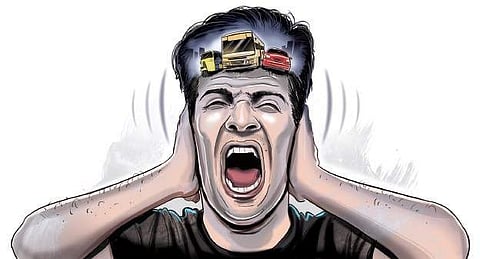

VISAKHAPATNAM: The Port City is rapidly falling prey to noise pollution, if the statistics available with the pollution control board are of any indication. The data suggest that the sound produced in the city is far more higher than the permissible levels. Be it residential area, commercial zones or industrial regions, the citizens are facing extreme levels of noise pollution, which the doctors say, is adding to the stress levels of people.
Commercial areas like Jagadamba, Maddilapalem, RTC Complex and a few others have been witnessing far higher noise pollution than the permissible limits. While the permissible limit is 65 decibels during the day time and 60 during the night time, the average decibels in those areas have been over 85.
AP Pollution Control Board (APPCB), Visakhapatnam, records suggest that last year, the annual average noise level recorded at Jagadamba junction was 84, while the same for Maddilapalem and RTC Complex junctions were 83.7 and 85.1 respectively, which is 20 decibels beyond the permissible limit.
Coming to sensitive areas like hospital zones and zoo park, the noise levels are over 30 to 40 decibels higher.
The APPCB findings at two stations- Zoo park and Siripuram, tells it all. A sensitive zone should have a noise level of 45 decibels during the day time and 40 night time. But the Siripuram zone recorded an average of 75 decibels in the day time and 65 during the night. In zoo park, the noise pollution levels stood at 58 and 55 in the day and night respectively. The annual average recorded at Siripuram zone was 74.7 last year during day time and 66.5 in the night.
The same for the zoo park was 59.9 and 54.8 respectively.
PCB sources said that compared to Siripuram, another sensitive zone like KGH records high noise pollution, thanks to the narrow roads and high vehicle density.
“Despite no-horn boards dotting the road, a few pay heed. With the shopping malls mushrooming in this zone, there is more vehicle movement which means more noise pollution,” he added.
The PCB team also found that the noise pollution is no less in residential areas. The PCB station at Seethammadhara, among the noted residential areas in the city, recorded noise pollution of 80.6 decibel last year, when compared to the permissible limit of 55 decibels. Residents of Daspalla Hills, Convent junction, Beach Road, Gnanapuram and a few others have been recording high noise pollution due to flight movement.
The industrial zones where the sound pollution levels should be 75 decibels are also said to be recording 25 to 30 decibels more than the limit. Interestingly, there are no stations to measure the noise in those areas.
The Traffic Police registered cases on sound and honking horns by the motorists. But, it is learnt that a very few get registered.
“If the vehicle is caught honking horns in the restricted zones like KGH, Court Road, Siripuram, then cases are registered. However, there are some minor cases too,” says ADCP Mahendra Patrudu.